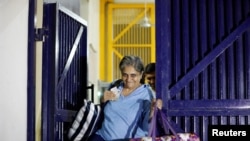A day after India’s Supreme Court ordered the release on interim bail of Teesta Setalvad, the prominent Indian rights activist walked out of a jail in Ahmedabad, in the western state of Gujarat, Saturday.
Gujarat police arrested Setalvad in June on accusations of criminal conspiracy, tutoring witnesses and fabrication of evidence against Prime Minister Narendra Modi, in connection with communal riots in the state in 2002.
In 2002, when Modi was the chief minister of Gujarat, more than 1,000 people, mostly Muslim, were killed in the riots. Setalvad is known for her fight in support of the victims.
“Considering the facts, including that she is a lady and submissions of other accused be considered purely on their merits, this court grants her interim bail,” the chief justice of India, Uday Umesh Lalit, said, while ordering Setalvad’s release Friday.
Rights activists have welcomed Setalvad’s release on interim bail.
There has been no comment from Modi on Setalvad’s release.
In its order, the court directed Setalvad to surrender her passport and cooperate with the police in the related investigation. The interim bail granted by the Supreme Court will be in effect until a court in Gujarat decides on her regular bail petition.
Rights activists claimed that during the 2002 riots, Gujarat police sat idly by while Hindu rioters went on a rampage and hacked and burned Muslims to death. India’s National Human Rights Commission blamed Modi’s Gujarat government for not taking steps to prevent violence and failing to respond to specific pleas for protection during the clashes. Many also alleged that Modi could have stopped or curbed the riot if he wanted.
A court-appointed special investigation team (SIT) filed a report in 2012 saying that there was “no prosecutable evidence” against Modi and his officials and exonerated all of them from involvement in the riots.
Fearing for his life during the riots, Ehsan Jafri, a Muslim former member of parliament from the Congress party, called senior government and police officials, seeking protection. The officials allegedly paid no heed to his appeals and Jafri was burned alive by a Hindu mob that also killed at least 35 other Muslims in his apartment community.
Journalist-turned-activist Setalvad founded the rights group Citizens for Justice and Peace (CJP) to advocate for victims of the riots.
In 2013, Setalvad and Zakia Jafri, Ehsan Jafri’s widow, filed a petition to the court challenging Modi’s exoneration by the investigation team. In the petition, Setalvad and Jafri demanded a criminal trial of Modi and dozens of state officials, alleging criminal conspiracy to spread riots.
On June 24, India’s Supreme Court dismissed that petition after saying that those who had “kept the pot boiling” should be put “in the dock.”
A day later, Home Minister Amit Shah accused Setalvad of providing false information about the Gujarat riots to the police, “intending to defame” Modi and his ruling Bharatiya Janata Party (BJP).
Gujarat police arrested Setalvad June 25, hours after Shah’s charges against her were broadcast on national TV.
In court, Setalvad’s lawyer said that the accusations against her were malicious and false. Although it has been more than two months since Setalvad was arrested, the Gujarat police have not filed formal charges.
Rights groups and opposition political leaders condemned Setalvad’s arrest and called it a political vendetta by the Modi government. Last month, a group of international scholars issued a joint letter requesting the Indian judicial authority release the activist.
Activist Henri Tiphagne said that the Supreme Court released Setalvad since there were no charges against her in a police document known as a first information report, or FIR. Police prepare this type of report when they receive information about the commission of an identifiable offense.
“Over two months in judicial custody to Teesta were meant to only harass her for her dogged follow-up of criminal actions that she had pursued against many persons, including the present prime minister [Modi] and home minister [Shah], which the NHRC [National Human Rights Commission] also pursued years ago in the Supreme Court,” Tiphagne, executive director of the rights group, People’s Watch, told VOA.
“The Gujarat High Court’s long adjournments in her bail only indicate how weakened our judiciary has turned out to be.”
Meenakshi Ganguly, South Asia director of Human Rights Watch, said Setalvad has been "hounded by the BJP and its supporters for her persistent campaign to seek justice for the Muslim victims" of the 2002 violence.
"She should never have been jailed, and it is a relief that the Supreme Court has done the right thing in granting her bail,” Ganguly told VOA.
“The Indian government should be concerned about the continuing partisanship in the justice system that wants activists like Teesta in custody while releasing those convicted of rape and murder during the Gujarat violence,” Ganguly added.





